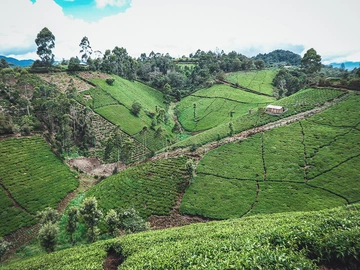Perennial agriculture in Uganda: Researching the impact on smallholders' livelihoods
December 18, 2019.
The northern part of Uganda has faced several challenges including two decades of civil war between 1986 and 2006 and a high influx of refugees from the Democratic Republic of Congo and South Sudan. Poverty levels are very high. Most people depend on smallholder farming in mixed cropping systems on less than two hectares of land. The major crops are seasonal cereal crops, including millet, sorghum, sesame (simsim) and upland rice. Perennial pigeon pea, however, has traditionally acted as both cash and food crop.
Monoculture annual cropping systems dominate the world’s food production and land use. In many cases, this has led to the destruction of natural environments beyond recovery. Annual systems have been identified as a major cause of soil degradation and erosion, leading to high levels of nutrient mining and leaching. With climate change and its impacts upon us, more sustainable approaches to agricultural production are urgently needed. There is a consensus that future approaches to agricultural intensification have to better emulate natural systems, if the next generations are to be fed sustainably.
The benefits of perennial agriculture
Perennial agriculture is the farming of long-term crops and trees that provide a mix of ecological, economic, and social services and benefits. In Uganda, perennial crops such as pigeon pea, cotton, coffee, and bananas are traditionally part of smallholder farming systems. They provide multiple services and benefits to farmers, including food, fodder for livestock, and fuel wood.
Perennial crops can save labor time, provide living roots and soil cover that persist throughout the year and, in addition, contribute to agrobiodiversity. A clear understanding of social and economic benefits and challenges of perennial systems is crucial for both future adoption and adaptation. So far, no study has explored the perenniality of farming systems in Uganda through a holistic, interdisciplinary, and participatory approach.
The Right Livelihood College Campus at ZEF
This research project is part of the Right Livelihood College (RLC) at ZEF, and works in cooperation with the “Alternative Nobel Prize” awarded Land Institute in Kansas, USA, the National Agricultural Research Organisation (NARO), Uganda and Makerere University in Uganda. The project critically investigates perennial smallholders’ mixed farming systems. It applies interdisciplinary and participatory approaches and uses qualitative and quantitative means of data collection, including household survey, focus group discussions, and whole-farm bio-economic modeling exercises. The goal is to understand smallholders’ knowledge, perceptions, and management practices of perennial pigeon pea cropping systems, and to determine the economic costs and benefits and the trade-offs that exist between annual, perennial and mixed systems. The contribution of this research is timely, as the future of smallholder farming, and of food production in general, is uncertain in Uganda. Natural environments are showing their limits. The question is, what role do perennial polyculture systems play currently and in the future to support smallholders’ livelihoods and sustain natural environments?
About the author
Dorothy Birungi Namuyiga
is a junior researcher at the Right Livelihood College Campus at ZEF with funding by the German Academic Exchange Service (DAAD).


